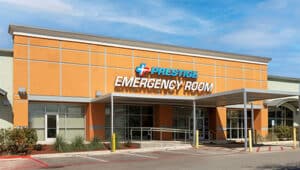When your newborn, infant, or young child has a pediatric emergency, every second counts. Having a trusted emergency room in mind can make all the difference.
At Prestige ER, we provide expert pediatric emergency care 24/7, ensuring your child receives prompt treatment when they need it most.
From high fevers and infections to breathing difficulties and injuries, our pediatric specialists are ready to diagnose, treat, and relieve common pediatric emergencies with gentle, expert care, bringing them comfort when they need it most.
Why Children Require Emergency Care
Younger children are more vulnerable to infections because their immune systems are still developing. Additionally, if they are not current on vaccines, they might not have immunity against preventable diseases, increasing their risk of serious illness.
Here are the top reasons for pediatric ER visits:
1. High Fever and Infections
A high fever could be a sign of serious infection, especially in babies and young children. Seek immediate medical attention if your child has a fever along with any of the following symptoms:
- Difficulty breathing.
- Lethargy or unresponsiveness.
- Seizures.
- Skin rash or signs of an allergic reaction.
Fever thresholds that require immediate medical attention.
- Newborn: 100.4°F or higher.
- Three months to three years: 102.2°F or higher.
- Three years and up: 102°F or higher for two or more days.
If your child has a fever accompanied by other concerning symptoms, don’t wait. Seek medical help right away to prevent complications.
2. Breathing Difficulties and Respiratory Issues
Young children with concerning breathing difficulties or respiratory issues require emergency medical attention to prevent severe complications. This is because their airways are smaller, still growing, and can become easily blocked.
Any infection or blockage in the lungs or airways can reduce their oxygen supply, leading to rapid deterioration and potentially life-threatening situations.
Here common signs and symptoms to watch for:
- Rapid or labored breathing.
- Nasal flaring while breathing.
- Grunting or wheezing while breathing.
- Unusual tiredness or lethargy.
- Loss of appetite.
- Fever.
3. Injuries and Accidents
Children are more vulnerable to injuries and accidents that cause long-term consequences. Why? Their bones are still developing and growing, and they have limited coordination and balance.
They are also much less likely to assess potential dangers in their environment, increasing their risk of falling, tripping, or colliding with other people or objects. Common injuries that require emergency care include:
- Head injuries involving loss of consciousness, vomiting, or changes in behavior.
- Compound fractures and broken bones.
- Severe burns on the hands, feet, face, neck, chest, or groin.
- Uncontrolled bleeding that lasts for more than a few minutes.
- Any signs of respiratory distress or allergic reaction.
- Any signs of serious illness (e.g., fever, neck stiffness, or severe headache).
4. Severe Allergic Reactions and Anaphylaxis
Severe allergic reactions and anaphylaxis are medical emergencies that can develop rapidly. Unless these conditions are treated right away, they can be fatal.
Recognizing the signs, seeking emergency medical care, or administering epinephrine are crucial. Here is what to watch for:
- Tightness or swelling of the lips, throat, tongue, or uvula (small hanging ball in the back of the throat).
- Difficulty swallowing.
- Hoarse voice.
- Wheezing or trouble breathing.
- Widespread hives.
- Severe itching.
- Stomach pain, nausea, and vomiting.
- Dizziness or fainting.
- Infants may exhibit sudden drooling, unusual sleepiness, fussiness, or crying.
5. Abdominal Pain and Digestive Emergencies
Children may require emergency medical care for abdominal pain and digestive issues resulting from serious, life-threatening conditions, such as:
- Appendicitis—An inflamed or infected appendix.
- Intussusception—A segment of the intestine slips inside another, like a telescope, creating a blockage.
- Bowel obstruction—A partial or complete intestinal blockage preventing the normal movement of waste products.
Watch for these signs and symptoms:
- Severe abdominal pain.
- Cramping.
- Vomiting.
- Bloating or abdominal swelling.
- Inability to pass gas or stool despite an urge.
- Constipation.
Now that you know the most common reasons for pediatric emergency room visits, it’s just as important to be prepared and help your child feel ready for their visit.
How to Prepare for a Pediatric ER Visit
If your child is having a medical emergency, go directly to your nearest Prestige ER location. We can provide prompt, effective care during your pediatric emergency room visit.
If you have time to prepare ahead of time, consider these tips:
- Call your pediatrician first. They know your child and their medical history best and can provide informed advice.
- If needed, treat your child at home with over-the-counter fever or pain medication before coming to the ER. Please note the medication, time, and dosage, as this will be one of the first questions you are asked in the ER.
- Remain calm and let your child know what to expect during their pediatric ER visit. They look to you for reassurance and safety.
- Bring your child’s medical history, list of current medications, health insurance card, known allergies, and contact information for their pediatrician or other relevant doctors or specialists.
- When possible, leave siblings at home. This allows you to focus on your sick child and any doctor recommendations.
Visit Prestige ER: Expert Pediatric Emergency Care
Prestige ER is equipped to handle a broad range of pediatric emergency services, including newborn and infant emergencies, fevers, child diarrhea, and school sports injuries.
We are veteran-owned and dedicated to providing excellent care to patients of all ages in our San Antonio community.
Our mission is to provide personalized, compassionate care for you, your children, and your entire family—365 days a year, 24 hours a day.
Find a location and visit us today.












